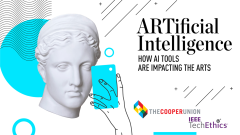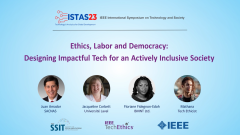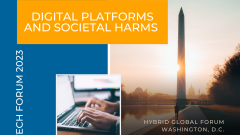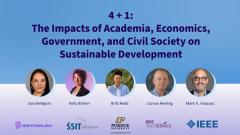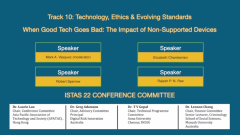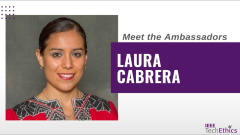Engineering Social Good: Technology and Moral Responsibility | IEEE TechEthics Virtual Panel
About the Video: Technology, in and of itself, is neither "good" nor "bad." This panel addresses the role engineers -- and others -- have in developing technology for the benefit of humanity.
About the Panelists:
Neth Daño is a Researcher who has extensive experience in development and policy work on issues in agriculture, agricultural biodiversity, biosafety, climate change and environmental governance in Southeast Asia. She earned her Bachelors’ degree in Development Studies (cum laude) from the University of the Philippines, dabbled briefly with Law, but ended up completing her Master’s degree in Community Development. Neth lives with her daughter Isabel in beautiful Davao City in Mindanao - the most exciting part of the Philippines. When given the luxury of time, she loves to read, putter around the house, and do her crochet and sewing projects. When there is much more time for leisure, she tries out scuba diving, wall climbing, and exploring new places with family and friends. When given the choice, she just wants to sleep...
Deborah G. Johnson recently retired as the Anne Shirley Carter Olsson Professor of Applied Ethics in the Science, Technology, and Society (STS) Program in the School of Engineering and Applied Science at the University of Virginia. Best known for her work on computer ethics and engineering ethics, Johnson’s research examines the ethical, social, and policy implications of technology, especially information technology. Johnson is the author/editor of seven books including most recently, Engineering Ethics: Contemporary and Enduring Debates to be published by Yale University Press in 2020. In addition to her books, Johnson has published over 100 papers in a wide variety of journals and edited volumes. In recognition of her contributions, Johnson received the Joseph Weizenbaum Award for life-long contributions to information and computer ethics from the International Society for Ethics and Information Technology in 2015. She received the John Barwise prize from the American Philosophical Association in 2004; the Sterling Olmsted Award from the Liberal Education Division of the American Society for Engineering Education in 2001; and the Making a Difference Award from the ACM Special Interest Group on Computers and Society in 2000.
Nicholas J. Kirsch is an Associate Professor in the Department of Electrical and Computer Engineering at the University of New Hampshire. He obtained his B.S. degree in Electrical Engineering from the University of Wisconsin - Madison in May 2003. Nicholas received an M.S. degree in Electrical Engineering and Telecommunications in June 2006 and a Ph. D. in Electrical Engineering in June 2009 from Drexel University in Philadelphia, Pennsylvania. In 2001 and 2002, Nicholas worked for W.L. Gore & Associates on fiber optic link modules and long-wavelength lasers. In graduate school, he worked with the Drexel Wireless Systems Laboratory and the Applied Communication and Information Networking group in Camden, NJ. His research interests include Multiple-input multiple-output (MIMO) communications systems, wireless sensor networks, cognitive radio, software defined radios, transparent antennas, and spectrum sensing technologies. This work is supported by the National Science Foundation, University of New Hampshire, and the Institute of Electrical and Electronic Engineers. Nicholas is the past chair of the Engineering Projects in Community Service in IEEE program (EPICS), which funds students to solve problems and engage with local non-profit organizations. Nicholas is a member of IEEE, Eta Kappa Nu, and AAAS.
Mark A. Vasquez (moderator) is a Certified Association Executive (CAE) with over 25 years of experience in association management at IEEE. He currently serves as the program manager for IEEE TechEthics, a program that drives conversations about the ethical and societal impacts of technology. In this capacity, he works to develop relationships with others in the technology ethics community, produces events, convenes thought leaders, and more. Mark is an engineering graduate of The Cooper Union.
Recorded on 23 April 2019 as part of the IEEE TechEthics Conversations Series.
About the Video: Technology, in and of itself, is neither "good" nor "bad." This panel addresses the role engineers -- and others -- have in developing technology for the benefit of humanity.
About the Panelists...
 Cart
Cart Create Account
Create Account Sign In
Sign In
